【教育专用】江苏省苏州市昆山市七年级英语下册Unit2NeighboursReading部分精练新版牛津版
江苏省七年级英语下册Unit2Neighbours(第1课时)教案(新版)牛津版

江苏省七年级英语下册Unit2Neighbours(第1课时)教案(新版)⽜津版Unit 2 NeighboursComic strip & Welcome to the unitI. Teaching aims and learning objectivesBy the end of the lesson, students should be able to:1. use the right words to describe people’s jobs and their workplaces;2. talk about their own neighbours and neighborhoods briefly;3. learn to cooperate with others and respond to the teacher’s instructions actively.II. Teaching contents1. New words and phrases: neighbour; will; visitor; like, wow, waiter, neighbourhood2. New structure: I’m going to visit our new neighbours.III. Focus of the lesson and predicted area of difficulty1. To talk about people’s jobs and workplaces.2. To talk about their neighbours and neighbourhoods.IV. Teaching proceduresComic stripStep 1 Lead-inT: Hello, boys and girls. Today, we’ll learn Unit 2 Neighbours. First, may I ask some questions about your neighbours?(1) Do you often talk with your neighbours?(2) Do you like visiting them?(3) Do you invite your neighbours to your home?(4) If you meet a new neighbour on the way, how will you feel? And what will you do?Step 2 Presentation1. Watch and answer.T: Helen and Jane live in the same neighbourhood. They meet a new neighbour on their way home. Do you want to know how they feel when they meet their new neighbour for the first time? Please enjoy a short video.T: Yes, they are both excited. Today, Eddie is going to visit his new neighbours too. But he looks worried. Watch the video and try to find the reason.2. Listen and answer.T: Listen to the tape and read the conversation by yourselves. Answer the questions below.(1) Where is Eddie going?(2) Will Eddie go with Hobo?(3) What does Hobo worry about?Step 3 Practice1. Read in roles.2. Role-play.3. Imagine and think.T: Do you think Eddie’s new neighbour s will welcome him? If you have a neighbour like Eddie, will you welcome him or her?Welcome to the unitStep 1 Lead-inTips for visiting new neighbours.T: Do you remember the two girls, Helen and Jane? Let’s go on watching. After they meet the new neighbour, what will they do?T: What shall we do when we meet new neighbours? Anyone would like to share yourideas?T: What questions do you think we can ask during the first visit?Birthplaces, jobs, workplaces …Step 2 Part A1. Ask and answer.T: Let’s meet some new neighbours. Look at these pictures. Please ask and answer in pairs.S1: What is he/she?S2: He/She is a …2. Match people with places.T: Turn to Page 19. Match the jobs with the places. Write the correct letters in the boxes.T: Please tell me your answers like this, “He/She is a …, and he/she works ….”3. Play a guessing game.T: Here are some blanks, which stand for your neighbours’ jobs. Listen to each job description and guess what it is. Use the sentence structure “Because he can …, I guess he is … and works …”Step 3 Part B1. Neighbourhood.T: People living in the same neighbourhood can help each other. What is a neighbourhood?T: Look at the chart. A neighbourhood is a large area. It may include schools, supermarkets, clubs, parks and so on. The neighbourhood makes people’s life easier and more comfortable.2. Simon’s neighbourhood.(1) Listen and answer.(2) Fill in the blanks.3. Students’ own neighbourhood.T: Work in pairs and talk about your neighbourhood. You can use the expressions on the screen to help you.4. How to be a good neighbour?T: What can we do for our neighbourhood? How can we be good neighbours? Watch a video and discuss in groups what weshould do and should not do in the neighbourhood.T: Love your neighbour as yourself. In this way, your neighbourhood will be a better place to live. V. Homework1. Remember the new words, phrases and structures.2. Write a short article about your neighbourhood.。
牛津译林版英语七下Unit 2《Neighbours》(Task)教学设计

牛津译林版英语七下Unit 2《Neighbours》(Task)教学设计一. 教材分析牛津译林版英语七下Unit 2《Neighbours》主要介绍了关于邻居的话题。
通过学习本单元,学生能够掌握与邻居相关的词汇和表达方式,学会如何描述邻居的特点和习惯,以及如何用英语进行简单的日常交流。
本单元的主要语言点包括形容词和副词的比较级和最高级形式,以及一般现在时态的运用。
二. 学情分析七年级的学生已经具备了一定的英语基础,能够听懂并运用一些基本的英语句型进行交流。
但是,对于形容词和副词的比较级和最高级形式以及一般现在时态的运用可能还不够熟练。
因此,在教学过程中,需要注重对这些语言点的讲解和操练,以确保学生能够正确运用。
三. 教学目标1.知识目标:–能够听懂、会说、会读本单元的生词和重点句子。
–掌握形容词和副词的比较级和最高级形式。
–学会用英语描述邻居的特点和习惯。
–能够运用一般现在时态进行简单的日常交流。
2.能力目标:–能够运用本单元所学知识进行简单的对话交流。
–能够正确运用形容词和副词的比较级和最高级形式。
3.情感目标:–培养学生对邻居的尊重和关心。
–培养学生的团队协作精神。
四. 教学重难点1.教学重点:–形容词和副词的比较级和最高级形式。
–一般现在时态的运用。
–与邻居相关的词汇和表达方式。
2.教学难点:–形容词和副词的比较级和最高级形式的运用。
–一般现在时态的运用。
五. 教学方法1.任务型教学法:通过设定各种任务,让学生在实际语境中运用所学知识,提高学生的语言运用能力。
2.情境教学法:创设各种生活情境,让学生在真实的语境中学习英语。
3.合作学习法:引导学生进行小组讨论和合作,培养学生的团队协作精神。
六. 教学准备1.教学课件:制作课件,包括本单元的生词、句子、图片等。
2.教学材料:准备与邻居相关的图片、故事等材料。
3.教学设备:投影仪、电脑等。
七. 教学过程1.导入(5分钟)利用课件展示与邻居相关的图片,引导学生进行观察和思考,引出本课的主题。
牛津译林版英语七下Unit 2《Neighbours》(welcome to the unit)教学

牛津译林版英语七下Unit 2《Neighbours》(welcome to the unit)教学设计一. 教材分析牛津译林版英语七下Unit 2《Neighbours》主要讨论了与邻居相关的日常交流用语。
通过本单元的学习,学生将能够掌握与邻居交流的基本用语,描述邻居的特点以及日常生活中与邻居的互动。
本单元主要包括以下几个部分:welcome to the unit、read and write、listen and say、look and say、task、self-check以及word bank。
二. 学情分析学生在进入七年级下学期时,已经具备了一定的英语基础,能够进行简单的英语听说读写活动。
但部分学生对于日常英语交流仍感到困难,特别是在实际应用中,可能出现表达不准确或胆怯的情况。
因此,在教学过程中,需要关注学生的个体差异,鼓励他们积极参与课堂活动,提高他们的自信心。
三. 教学目标1.知识目标:学生能够掌握与邻居交流的基本用语,描述邻居的特点以及日常生活中与邻居的互动。
2.能力目标:学生能够在实际情景中运用所学知识进行日常英语交流,提高他们的口语表达能力。
3.情感目标:学生能够学会尊重他人,培养良好的邻里关系。
四. 教学重难点1.重点:学生能够掌握与邻居交流的基本用语,描述邻居的特点以及日常生活中与邻居的互动。
2.难点:学生在实际情景中运用所学知识进行日常英语交流,特别是听力和口语能力的运用。
五. 教学方法1.情境教学法:通过设置各种与邻居相关的实际情景,让学生在情境中学习与练习英语。
2.交际教学法:鼓励学生积极参与课堂互动,进行真实的英语交流。
3.任务型教学法:通过完成各种任务,让学生在实践中运用所学知识。
六. 教学准备1.教师准备:提前熟悉教材内容,了解学生的学习情况,设计合理的教学活动和任务。
2.学生准备:预习教材内容,了解本单元的学习目标。
七. 教学过程1.导入(5分钟)教师通过提问方式引导学生回顾上一单元学到的内容,如家庭成员的称呼和特点。
江苏省苏州市昆山市七年级英语下册Unit2NeighboursIntegratedskills课件1(新版)牛津版

Listen & Answer:What are they?
taxi drivers
They can take you anywhere you want to go by taxi.
Listen & Answer:What are they?
nurses
They are always kind. When you are in hospital, they look after you.
singer(歌手) writer(作家)
C: That sounds like a good idea. I do actor(演员)
well
farmer(农民)
in … so I’m going to be a/an …. cleaner(清洁工)
A: Great! I’m sure you’ll do very well. What about you …?
?
Millie a teacher
She loves school.
Sandy an artist
She’s good at drawing.
teacher
What are you going to be(想成为) in the futurjoeb?s(在将来)
policeman
Group interview(小组采访):
Unit2 Neighbours
Listen & Answer:What are they? teachers
They work in a school to help children learn
Listen & Answer:What are they?
江苏省苏州市昆山市七年级英语下册 Unit 2 Neighbours Task部分精练 牛津版
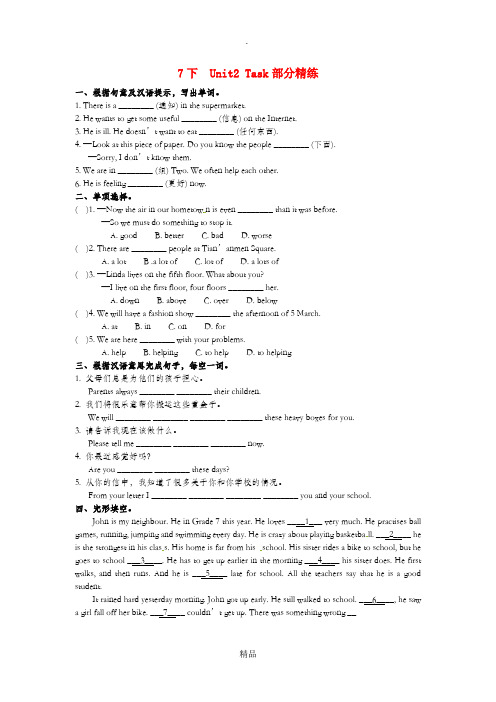
7下 Unit2 Task部分精练一、根据句意及汉语提示,写出单词。
1. There is a ________ (通知) in the supermarket.2. He wants to get some useful ________ (信息) on the Internet.3. He is ill. He doesn’t want to eat ________ (任何东西).4. —Look at this piece of paper. Do you know the people ________ (下面).—Sorry, I don’t know them.5. We are in ________ (组) Two. We often help each other.6. He is feeling ________ (更好) now.二、单项选择。
( )1. —Now the air in our hometow n is even ________ than it was before.—So we must do something to stop it.A. goodB. betterC. badD. worse( )2. There are ________ people at Tian’anmen Square.A. a lot B .a lot of C. lot of D. a lots of( )3. —Linda lives on the fifth floor. What about you?—I live on the first floor, four floors ________ her.A. downB. aboveC. overD. below( )4. We will have a fashion show ________ the afternoon of 5 March.A. atB. inC. onD. for( )5. We are here ________ with your problems.A. helpB. helpingC. to helpD. to helping三、根据汉语意思完成句子,每空一词。
牛津译林版英语七下Unit 2《Neighbours》(Grammar)教学设计
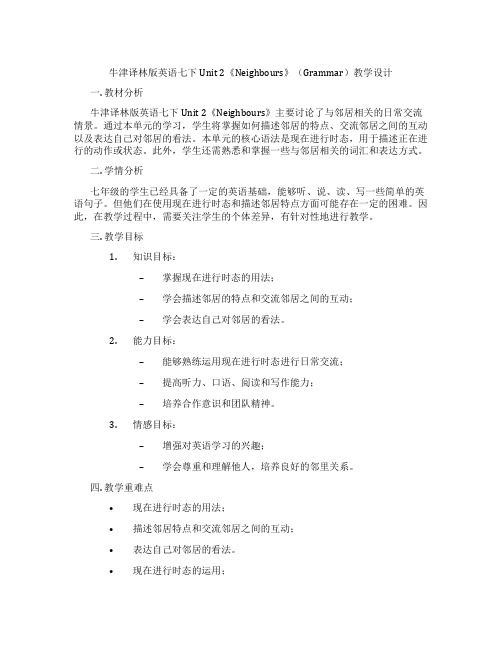
牛津译林版英语七下Unit 2《Neighbours》(Grammar)教学设计一. 教材分析牛津译林版英语七下Unit 2《Neighbours》主要讨论了与邻居相关的日常交流情景。
通过本单元的学习,学生将掌握如何描述邻居的特点、交流邻居之间的互动以及表达自己对邻居的看法。
本单元的核心语法是现在进行时态,用于描述正在进行的动作或状态。
此外,学生还需熟悉和掌握一些与邻居相关的词汇和表达方式。
二. 学情分析七年级的学生已经具备了一定的英语基础,能够听、说、读、写一些简单的英语句子。
但他们在使用现在进行时态和描述邻居特点方面可能存在一定的困难。
因此,在教学过程中,需要关注学生的个体差异,有针对性地进行教学。
三. 教学目标1.知识目标:–掌握现在进行时态的用法;–学会描述邻居的特点和交流邻居之间的互动;–学会表达自己对邻居的看法。
2.能力目标:–能够熟练运用现在进行时态进行日常交流;–提高听力、口语、阅读和写作能力;–培养合作意识和团队精神。
3.情感目标:–增强对英语学习的兴趣;–学会尊重和理解他人,培养良好的邻里关系。
四. 教学重难点•现在进行时态的用法;•描述邻居特点和交流邻居之间的互动;•表达自己对邻居的看法。
•现在进行时态的运用;•准确描述邻居特点和交流邻居之间的互动。
五. 教学方法1.情境教学法:通过设定真实的邻里场景,让学生在实际语境中学习和运用英语;2.交际教学法:鼓励学生进行角色扮演,模拟邻里之间的交流,提高口语表达能力;3.任务型教学法:通过完成小组任务,培养学生合作意识和团队精神;4.反馈与激励:及时给予学生反馈,鼓励学生积极参与课堂活动。
六. 教学准备1.教材:牛津译林版英语七下Unit 2《Neighbours》;2.多媒体课件:图片、视频、音频等教学资源;3.学习任务单:用于引导学生进行小组讨论和任务完成;4.板书用品:黑板、粉笔等。
七. 教学过程1.导入(5分钟)利用图片或视频展示邻居之间的日常生活场景,引导学生谈论自己的邻居。
牛津译林版英语七下Unit2《Neighbours》(Revision)说课稿
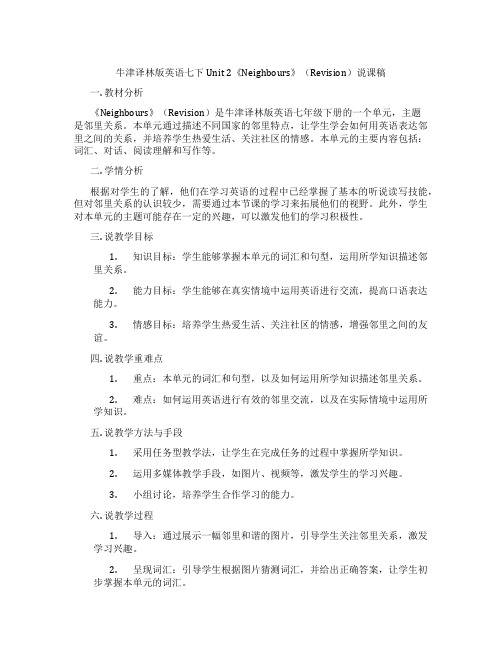
牛津译林版英语七下Unit 2《Neighbours》(Revision)说课稿一. 教材分析《Neighbours》(Revision)是牛津译林版英语七年级下册的一个单元,主题是邻里关系。
本单元通过描述不同国家的邻里特点,让学生学会如何用英语表达邻里之间的关系,并培养学生热爱生活、关注社区的情感。
本单元的主要内容包括:词汇、对话、阅读理解和写作等。
二. 学情分析根据对学生的了解,他们在学习英语的过程中已经掌握了基本的听说读写技能,但对邻里关系的认识较少,需要通过本节课的学习来拓展他们的视野。
此外,学生对本单元的主题可能存在一定的兴趣,可以激发他们的学习积极性。
三. 说教学目标1.知识目标:学生能够掌握本单元的词汇和句型,运用所学知识描述邻里关系。
2.能力目标:学生能够在真实情境中运用英语进行交流,提高口语表达能力。
3.情感目标:培养学生热爱生活、关注社区的情感,增强邻里之间的友谊。
四. 说教学重难点1.重点:本单元的词汇和句型,以及如何运用所学知识描述邻里关系。
2.难点:如何运用英语进行有效的邻里交流,以及在实际情境中运用所学知识。
五. 说教学方法与手段1.采用任务型教学法,让学生在完成任务的过程中掌握所学知识。
2.运用多媒体教学手段,如图片、视频等,激发学生的学习兴趣。
3.小组讨论,培养学生合作学习的能力。
六. 说教学过程1.导入:通过展示一幅邻里和谐的图片,引导学生关注邻里关系,激发学习兴趣。
2.呈现词汇:引导学生根据图片猜测词汇,并给出正确答案,让学生初步掌握本单元的词汇。
3.学习句型:通过对话教学,让学生学会如何用英语描述邻里关系。
4.实践环节:学生进行角色扮演,模拟邻里之间的交流,巩固所学知识。
5.阅读理解:引导学生阅读一篇关于邻里关系的短文,提高学生的阅读能力。
6.写作练习:让学生撰写一篇关于邻里关系的短文,培养学生的写作能力。
7.总结:对本节课所学内容进行总结,强化学生对邻里关系的认识。
江苏省昆山市七年级英语下册 Unit 2 Neighbours Readi

the neighbourhood with different probTlems.
()
T
ቤተ መጻሕፍቲ ባይዱ
• 2 Usually there is a meeting at the weecokmenpdut.e(Fr )
• 3 Simon wbiacnyctsleto ask someone tFo fix his
Careful reading
Problem
Computer doesn’t work.
ask an engineer to check it
Bicycle is broken. ask someone to fix it
Homework is difficult.
Some college students can help.
Old people need help.
Volunteers do some shopping for them and clean their flats.
• B2 True or False
• 1 Volunteers share their skills and help people in
Role play Four students a group. You live in a big community. Two students need different help and two volunteers help them.
Example: A: Hello,volunteers. My…. is broken. Can you help me to fix it? B: Sure. I am an engineer. Let me see.
苏教牛津译林版七年级下册英语(7B)unit 2 Neighbours reading 课件

adj. 愿意帮忙的/有用的
n. 志愿者, n. 社区 n. 技能,技巧 帮助某人解决某种困难 n. 问题,难题 pron. 某事,某物 n. 工程师;技师
Words & phrases review
9.check 10.broken 11.someone 12.fix 13.anyone 14.college 15.do some shopping
2. When and where do they often meet ? They often meet at the community centre at the weekend.
3. What do they do to help others?
…check the computer… ; …fix the bicycle…; …help with homework; …help the old people (visit…do some shopping…clean…)
primary school 小学
Junior middle school 初中 Senior middle school 高中
College 学院 University 大学
the day after tomorrow yesterday 昨天 前天我丢了手机。
前天
I lost my mobile phone .....
I’m going to ask a computer_e_n_g_i_n_e_er_ to check it. My cousin Annie’s =bike _b_i_c_y_c_le_ is broken, so she’s going to ask someone to _f_ix__ it. Amy: Can you find _a_n_y_o_n_e_ to help you with your homework?
江苏省昆山市七年级英语下册Unit2NeighboursWelcome课件1(新版)牛津版

doctor
Mr. Zhang
Mr Zhang is a _d_o_c_to_r_. He often helps people with health problems in the hospital. We think he is really helpful.
Nancy
teacher
Miss Zhang is a t_e_a_c_h_e_r. She teaches English in a middle school. She is kind and friendly. All the children like her.
He is going to visit his friends if he is free tomorrow.
②天气预报(weather forecast)说要下雨了。
The weather forcasts says it is going to rain.
I will meet them too! will+V原 构成将来时, 否定为won't
new neighbours? He will enjoy food and drinks. 3. Do you think Eddie's new neighbours welcome him? Why or why not?
1.I'm going to visit our new neighbours. be going to do (动原),构成将来时. 表“将要做...,打算做..." ①如果明天有空,他打算去看他的朋友。
Jobs and working places of your family members or your neighbours.
江苏省昆山市七年级英语下册Unit2NeighboursWelcome课

postman
in the post office
They are postmen.
farmer on a farm
office worker in an office
driver
What does he do every day?
He drives a taxi.
a doctor
two nurses
neighbourhood? B: We have … A: Do you like living there? B: Yes. It’s good to live in a
neighbourhood like that.
Where are you going? I am going to …….
Listen to Amy and Simon’s conversation.
1 How many buildings are there in Simon’s neighbourhood
20 2 What do you have around Simon’s neighbourhood
We have supermarkets,restaurants, a school and a hospital.
cook
farmer
Make a dialogue
A: Who is your neighbour? B:…is my neighbour A:What’s your neighbour?/
What does your neighbour do ? B:He is/she is…. A:Where does he/she work? B:He/She works in …..
They work in a ___h_o_s_p_i_ta_l____.
江苏省苏州市昆山市七年级英语下册 Unit 2 Neighbours Comic strip and
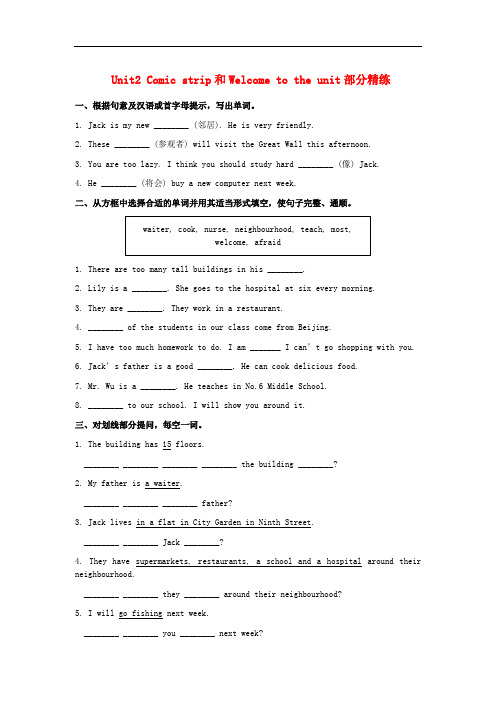
Unit2 Comic strip和Welcome to the unit部分精练一、根据句意及汉语或首字母提示,写出单词。
1. Jack is my new ________ (邻居). He is very friendly.2. These ________ (参观者) will visit the Great Wall this afternoon.3. You are too lazy. I think you should study hard ________ (像) Jack.4. He ________ (将会) buy a new computer next week.二、从方框中选择合适的单词并用其适当形式填空,使句子完整、通顺。
1. There are too many tall buildings in his ________.2. Lily is a ________. She goes to the hospital at six every morning.3. They are ________. They work in a restaurant.4. ________ of the students in our class come from Beijing.5. I have too much homework to do. I am _______ I can’t go shopping with you.6. Jack’s father is a good ________. He can cook del icious food.7. Mr. Wu is a ________. He teaches in No.6 Middle School.8. ________ to our school. I will show you around it.三、对划线部分提问,每空一词。
江苏省昆山市七年级英语下册 Unit 2 Neighbours Task

Health Centre Fix-It Club Art and Design Group
担心
较好,更好
If there's__s_o_m_e_t_h_in_g _w__r_o_n_g_with your washing machine.Our _e_n_g_in_e_e_r_sare here to help with your problems!
English Corner
fill blanks
(填空)
Becouse of (因为)your help,Simon is very happy.So he write an article about this on his blog(博客) .
community centre
5 March
Time
Activities
Your own community centre
Place
It’s your turn to write !
Health Fix-it Art & Design Music Computer Job
Centre Club Group
Group Club
Group
Step1
check a computer. Come and join us!
Music Group
At 7 o’clock on Thursday evening. Practise for the community shows
on 12 April!
Looking for a new job?
Fit Club!
Paragraph 1 _T__im__e__ and __p_l_a_c__e_ of the helping hands” meeting
江苏省苏州市昆山市七年级英语下册Unit2NeighboursReading部分精练牛津版(202

江苏省苏州市昆山市七年级英语下册Unit 2 Neighbours Reading部分精练(新版)牛津版编辑整理:尊敬的读者朋友们:这里是精品文档编辑中心,本文档内容是由我和我的同事精心编辑整理后发布的,发布之前我们对文中内容进行仔细校对,但是难免会有疏漏的地方,但是任然希望(江苏省苏州市昆山市七年级英语下册Unit 2 Neighbours Reading部分精练(新版)牛津版)的内容能够给您的工作和学习带来便利。
同时也真诚的希望收到您的建议和反馈,这将是我们进步的源泉,前进的动力。
本文可编辑可修改,如果觉得对您有帮助请收藏以便随时查阅,最后祝您生活愉快业绩进步,以下为江苏省苏州市昆山市七年级英语下册Unit 2 Neighbours Reading部分精练(新版)牛津版的全部内容。
7下 Unit2 Reading部分精练一、根据句意及汉语提示完成句子,每空词数不限。
1. There are two ________________ (社区中心) in our neighbourhood.2。
His father is good at computer. He is a ________________ (电脑工程师).3. My watch is ________________ (坏了). It doesn't work now。
4。
These ________________ (大学生) come from the USA. They are studying in China now.5. Jack, you’d better ________________ (检查) your homework again and again.6。
We should help each other because ________________ (任何人) needs help.7. There students are ________________ (善良且乐于助人).二、用所给单词的适当形式填空。
江苏省苏州市昆山市七年级英语下册Unit2NeighboursComicstripandWelco

江苏省苏州市昆山市七年级英语下册Unit 2 Neighbours Comic strip and Welcome to the Unit部分精练(新版)牛津版编辑整理:尊敬的读者朋友们:这里是精品文档编辑中心,本文档内容是由我和我的同事精心编辑整理后发布的,发布之前我们对文中内容进行仔细校对,但是难免会有疏漏的地方,但是任然希望(江苏省苏州市昆山市七年级英语下册Unit 2 Neighbours Comic strip and Welcome to the Unit部分精练(新版)牛津版)的内容能够给您的工作和学习带来便利。
同时也真诚的希望收到您的建议和反馈,这将是我们进步的源泉,前进的动力。
本文可编辑可修改,如果觉得对您有帮助请收藏以便随时查阅,最后祝您生活愉快业绩进步,以下为江苏省苏州市昆山市七年级英语下册Unit 2 Neighbours Comic strip and Welcome to the Unit部分精练(新版)牛津版的全部内容。
Unit2 Comic strip和Welcome to theunit部分精练一、根据句意及汉语或首字母提示,写出单词。
1。
Jack is my new ________ (邻居)。
He is very friendly.2。
These ________ (参观者) will visit the Great Wall this afternoon。
3。
You are too lazy。
I think you should study hard ________ (像) Jack.4。
He ________ (将会) buy a new computer next week。
二、从方框中选择合适的单词并用其适当形式填空,使句子完整、通顺.waiter, cook, nurse, neighbourhood, teach,most, welcome, afraid1. There are too many tall buildings in his ________.2。
江苏省七年级英语下册 Unit 2 Neighbours welcome to the Unit课件

He’s afraid they won’t welcome visitors like Eddie.
Task 5 Role- play
Task 6
Do you want to be a good neighbour?
Good neighbour
help people in need be always kind
It’s in City Garden in Ninth Street.
2. How many buildings are there in his neighbourhood?
About 20 buildings.
3. How many floors do the buildings have?
Most of them have 14 floors.
Task 3 Practice
A: Where do you live? B: I live in… A: How many buildings are there in your neighbourhood? B: There are about…..Most of them have--floors. A: What do you have around your neighbourhood? B: We have… A: Do you like living there? B: …
a doctor
a nurse
in a hospital
postman in the post office
a farmer
on the farm
Guessing game
farmers
江苏省苏州市昆山市七年级英语下册Unit2NeighboursIntegratedskillsan

江苏省苏州市昆山市七年级英语下册Unit 2 Neighbours Integrated skills and Study skills部分精练(新版)牛津版编辑整理:尊敬的读者朋友们:这里是精品文档编辑中心,本文档内容是由我和我的同事精心编辑整理后发布的,发布之前我们对文中内容进行仔细校对,但是难免会有疏漏的地方,但是任然希望(江苏省苏州市昆山市七年级英语下册Unit 2 Neighbours Integrated skills and Study skills部分精练(新版)牛津版)的内容能够给您的工作和学习带来便利。
同时也真诚的希望收到您的建议和反馈,这将是我们进步的源泉,前进的动力。
本文可编辑可修改,如果觉得对您有帮助请收藏以便随时查阅,最后祝您生活愉快业绩进步,以下为江苏省苏州市昆山市七年级英语下册Unit 2 Neighbours Integrated skills and Study skills 部分精练(新版)牛津版的全部内容。
Unit2 Integrated skills和Studyskills部分精练一、根据句意及汉语提示,写出单词.1. If you park your car in the wrong place, a traffic ________ (警察) will soon findit.2. How many ________ (人) are there in the room?3。
He has a ________ (工作) as a teacher.4。
Nobody can tell what will happen in the ________ (将来)。
5。
A lot of famous ________ (艺术家) will come here soon.6。
The terrible smell makes people ________ (生病的).7. The song You and Me ________ (听起来) great.8。
江苏省七年级英语下册 Unit 2 Neighbours(第2课时)教案 (新版)牛津版
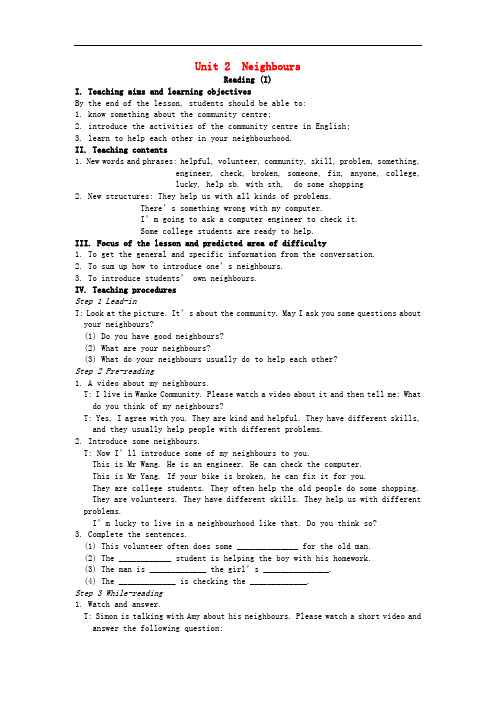
Unit 2 NeighboursReading (I)I. Teaching aims and learning objectivesBy the end of the lesson, students should be able to:1. know something about the community centre;2. introduce the activities of the community centre in English;3. learn to help each other in your neighbourhood.II. Teaching contents1. New words and phrases: helpful, volunteer, community, skill, problem, something,engineer, check, broken, someone, fix, anyone, college,lucky, help sb. with sth, do some shopping2. New structures: They help us with all kinds of problems.There’s something wrong with my computer.I’m going to ask a computer engineer to check it.Some college students are ready to help.III. Focus of the lesson and predicted area of difficulty1. To get the general and specific information from the conversation.2. To sum up how to introduce one’s neighbours.3. To introduce students’ own neighbours.IV. Teaching proceduresStep 1 Lead-inT: Look at the picture. It’s about the community. May I ask you some questions about your neighbours?(1) Do you have good neighbours?(2) What are your neighbours?(3) What do your neighbours usually do to help each other?Step 2 Pre-reading1. A video about my neighbours.T: I live in Wanke Community. Please watch a video about it and then tell me: What do you think of my neighbours?T: Yes, I agree with you. They are kind and helpful. They have different skills, and they usually help people with different problems.2. Introduce some neighbours.T: Now I’ll introduce some of my neighbours to you.This is Mr Wang. He is an engineer. He can check the computer.This is Mr Yang. If your bike is broken, he can fix it for you.They are college students. They often help the old people do some shopping. They are volunteers. They have different skills. They help us with different problems.I’m lucky to live in a neighbourhood like that. Do you think so?3. Complete the sentences.(1) This volunteer often does some ______________ for the old man.(2) The ____________ student is helping the boy with his homework.(3) The man is _____________ the girl’s _______________.(4) The _____________ is checking the _____________.Step 3 While-reading1. Watch and answer.T: Simon is talking with Amy about his neighbours. Please watch a short video and answer the following question:What happens when Simon has problems? (He can get help from the community centre.)2. Scan for the specific information.T: Listen to the conversation again and try to find some specific information about Simon’s neighbours. You can circle the useful words while looking for answers.(1) Who can give people help?(2) When do they meet?(3) Where do they meet?(4) What do they do there?3. Summary.T: Retell what good things the volunteers do according to the pictures.4. Detailed reading.(1) Read and do the True and False.T: Amy is writing something about Simon’s neighbours. Write a T if the sentence is true or an F if it is false.(2) Read and fill in the blanks.5. Group work: Act it out!T: Work in groups of four. Suppose one of you is Simon and the others are volunteers at Simon’s community centre. Talk about volunteers’skills and what they can do to help neighbours. You can use the conversation on the screen as a model. Step 4 Post-reading1. Make up a dialogue.T: Do the people in your community have any problems? If you have problems, what will you do? Work in groups and talk about your problems and the way to deal with them.2. Conclusion.T: Neighbours are important to us. We should always help each other.V. Homework1. Read the conversation aloud.2. List the good things that Simon’s neighbours do.【教学反思】。
- 1、下载文档前请自行甄别文档内容的完整性,平台不提供额外的编辑、内容补充、找答案等附加服务。
- 2、"仅部分预览"的文档,不可在线预览部分如存在完整性等问题,可反馈申请退款(可完整预览的文档不适用该条件!)。
- 3、如文档侵犯您的权益,请联系客服反馈,我们会尽快为您处理(人工客服工作时间:9:00-18:30)。
7下 Unit2 Reading部分精练一、根据句意及汉语提示完成句子,每空词数不限。
1. There are two ________________ (社区中心) in our neighbourhood.2. His father is good at computer. He is a ________________ (电脑工程师).3. My watch is ________________ (坏了). It doesn’t work now.4. These ________________ (大学生) come from the USA. They are studying in China now.5. Jack, you’d better ________________ (检查) your homework again and again.6. We should help each other because ________________ (任何人) needs help.7. There students are ________________ (善良且乐于助人).二、用所给单词的适当形式填空。
1. Jack is a ________ (help) boy. We all like him very much.2. My mother asks me ________ (not watch) TV before finishing my homework.3. —What happened, Jack?—My bike is ________ (break).4. —Excuse me. Could I have ________ (something) to eat?—Of course, you can.5. We are ready ________ (help) those people in need.6. Jack, I’m too busy now. Can you help me ________ (clean) the blackboard?7. Seven is my ________ (luck) number.8. I often help my mother do some ________ (clean).三、从方框中选择合适的短语并用其适当形式填空,使句子完整、通顺。
2. My mother is very busy. I often help her do a lot of housework ________________.3. The teachers in our school often ________________ on Mondays at the school hall.4. My aunt is good at making kites. She can make ________________ kites.5. There is little food at home. You’d better ________________ at once.四、句型转换,每空一词。
1. Something is wrong with my watch. (改为同义句)________ ________ ________ ________ ________ my watch.2. They are going to play football after school. (改为一般疑问句)________ they ________ ________ ________ football after school?3. There is someone in the room. (改为一般疑问句)________ ________ ________ in the room?4. They often meet at the school gate at 7 a.m. (对划线部分提问)________ ________ they often ________ at the school gate?5. I often visit the old people on Sundays. (对划线部分提问)________ ________ you often ________ on Sundays?五、根据汉语意思完成句子,每空一词。
1. 这些社会工作者经常在一起分享他们不同的技能。
These ________ ________ often ________ ________ ________ ________ together. 2. 王老师经常帮助我们解决数学问题。
Teacher Wang often ________ us ________ Maths ________.3. 王叔叔叫我们不要在马路上踢足球。
Uncle Wang ________ us ________ ________ ________ football on the road.4. 张华很幸运地通过了这次英语考试。
Zhang Hua ________ ________ ________ pass this English exam.5. 我可以找人帮你修理你的椅子。
I can ________ ________ ________ help you ________ your chair.六、根据短文内容完成下列各题。
Buddy and Teak were two dogs. They lived in the same neighbourhood. They loved each other and played together every day.One evening, Buddy didn’t come home. Buddy’s family went out to look for him, but they had no luck finding him. To their surprise. Teak came to their house alone an s started barking. Buddy’s family didn’t know why.Teak didn’t stop barking. He barked at anyone he could see. Finally, one morning, Teak followed David about, barking loudly and running towards the woods, as if to say, “Follow me!”The little dog led (领着) David towards the woods. There, the boy found Buddy stuck () in a hole with a hurt leg. Around him was some dog food. David knew it was Teak’s food from home. David suddenly realized (意识到) that Teak had brought this food to his friend.David helped to free Buddy and got his leg treated (治疗). For many years, the two families watched the two dogs play happily together.1. The best title (标题) is ________________.根据短文内容判断正(T)误(F)( )2. Buddy and Teak were good friends.( )3. Buddy did a lot for Teak when he was stuck in the woods.( )4. Buddy’s family found him with the help of Teak.( )5. Buddy and Teak lived together in the same family.七、阅读理解。
Many kinds of animals eat plants. But do you know plants can eat animals? Maybeyou feel strange, but that’s tr ue. Some plants eat meat. Some of them are big, and they can eat small animals. One famous meat-eating plant is the Venus flytrap (捕蝇草).The Venus flytrap is a very strange plant. It grows in dry parts of the USA. Its leaves (叶子) can open and close very quickly. Inside the leaves, there are three small hairs. If a fly (苍蝇) is on one of the hairs, the leaves close quickly. The fly cannot get out. In about half an hour, the leaves press the fly until it dies. Then, the plant eats the fly slowly.Why do plants eat animals? Most plants get things they need from the sun, the air and the ground. In some places, the ground is very poor. It doesn’t have all these important things like nitrogen (氮). Animal meat has a lot of nitrogen, so some plants eat meat to get nitrogen.( )1. The Venus flytrap is a kind of ________.A. plantB. animalC. foodD. meat( )2. The Venus flytrap grows in ________.A. most parts of the worldB. some parts of AfricaC. dry parts of the United StatesD. wet (潮湿的) parts of England ( )3. From the passage, we learn that ________.A. no plants can eat peopleB. all plants can eat animalsC. some plants can eat peopleD. some plants can eat animals( )4. The underlined word ‘press’ probably means “________” in Chinese.A. 挤压B. 关上C. 打开D. 松开( )5. Some plants eat animal meat because ________.A. their leaves can open and close quicklyB. some animals are dangerous to themC. they want to get what they needD. they want to keep themselves safe7下 Unit2 Reading部分精练一、1. community centres 2. computer engineer 3. broken 4. college students 5. check 6. anyone 7. kind and helpful二、1. helpful 2. not to watch 3. broken 4. something 5. to help 6. clean 7. lucky 8. celaning三、1. are ready to 2. at the weekend 3. have a meeting 4. all kinds of 5. do some shopping四、1. There is something wrong with 2. Are; going to play 3. Is there anyone 4. When do; meet 5. What do; do五、1. social workers; share their different skills 2. helps; with; problems 3. asks; not to play 4. is lucky to 5. find someone to; fix六、1. Neighbourhood Dogs 2. T 3. F 4. T 5. F七、1-5 ACDAC。
